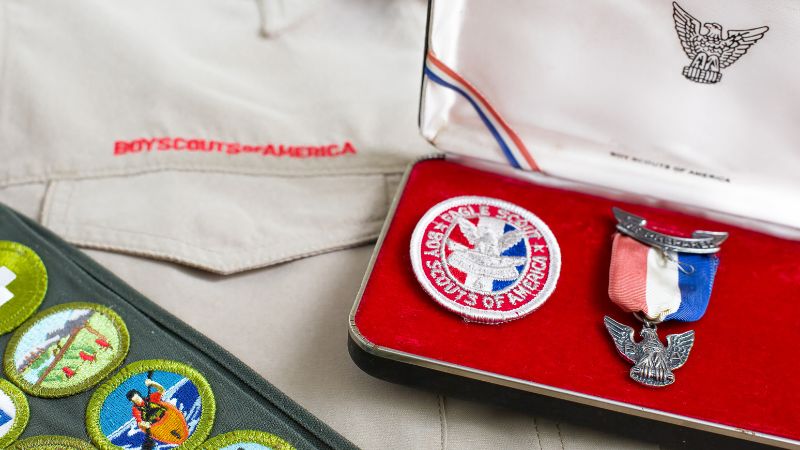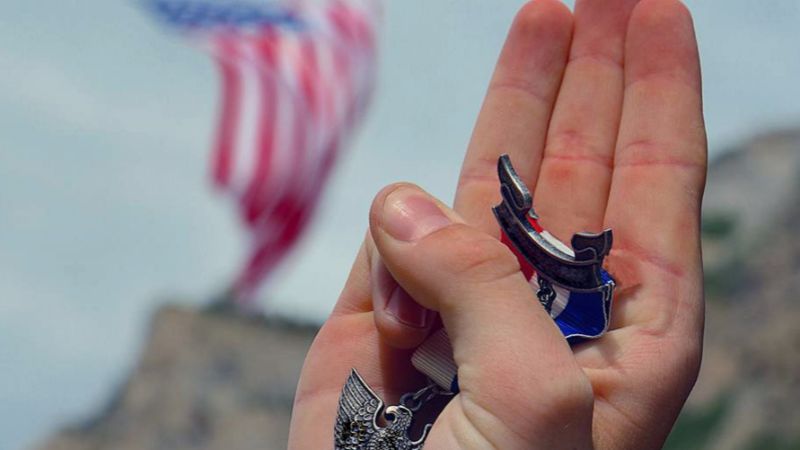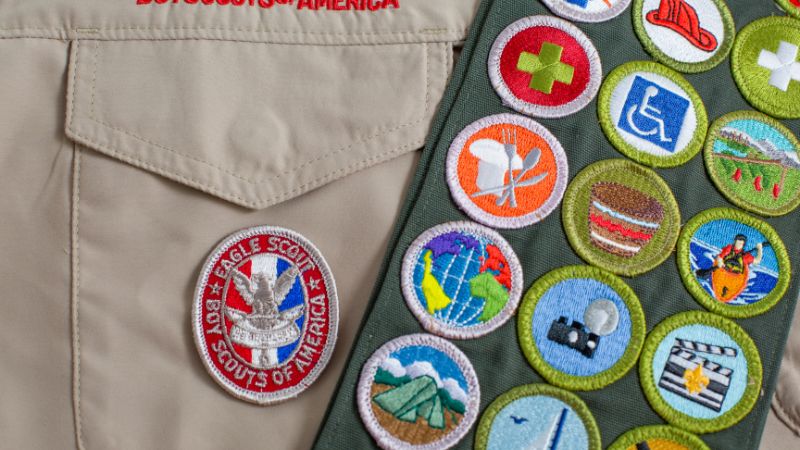Achieving the Eagle Scout rank is like scaling a mountain. It’s tough, but the view from the top is worth it. This rank is the highest achievement in Scouts BSA, recognized nationwide for its rigor and prestige.
Only a select few reach this peak, demonstrating exceptional dedication, leadership, and community service. If you think that you are good enough to reach this status, the steps I will share in the following sections will surely help you become an Eagle Scout.
1. Understand What It Means to Be an Eagle Scout

Becoming an Eagle Scout isn’t just about wearing a badge; it’s about who you become in the process. This title is a lifelong honor, reflecting a Scout’s commitment to the highest standards of character and citizenship.
It’s a journey that challenges you, shapes you, and prepares you for life. From teaching you to tie complicated knots to giving you an education boost. Eagle Scouts are known for their leadership, moral character, and service to their communities. This rank opens doors, offering benefits like college scholarships and a competitive edge in careers.
2. Learn More About the Requirements
The path to Eagle Scout is structured but flexible, allowing you to explore your interests and develop diverse skills. You need to climb through the ranks: Scout, Tenderfoot, Second Class, First Class, Star, Life, and then Eagle. Each rank builds on the last, with increasing challenges and responsibilities.
You’re also required to earn 21 merit badges, including 13 specifically required ones. These badges cover a wide range of skills and knowledge areas, from camping and first aid to citizenship and personal management. The merit badge system encourages you to explore new areas and develop a broad skill set.
3. Leadership and Service

Leadership is central to the Eagle Scout experience. You must actively serve in a leadership role in your troop. This experience hones your leadership skills in real-world scenarios, preparing you for future roles in your career and community.
The Eagle Scout Service Project is your chance to make a meaningful contribution to your community. This project, which you’ll plan, lead, and execute, is more than just a requirement; it’s an opportunity to leave a lasting impact and demonstrate your ability to bring a vision to life.
4. Review and Recognition
After fulfilling all the requirements, you’ll undergo a Scoutmaster Conference and an Eagle Scout Board of Review. These are not just formalities; they’re opportunities to reflect on your journey and articulate your growth and learning.
Once approved, you’ll be officially recognized as an Eagle Scout in an Eagle Court of Honor ceremony. This ceremony is a celebration of your hard work, dedication, and the positive impact you’ve made on your troop and community.
5. Time Management and Strategy

Time management is crucial in your quest to become an Eagle Scout. The average journey takes between 4 to 6 years, but this varies. Start by setting clear goals and timelines for each rank and merit badge. Tackle the more challenging badges early on, especially those like Personal Management and Personal Fitness, which require ongoing tracking.
Scout camps are a goldmine for earning multiple badges quickly. These camps, often held in summer and winter, offer an intensive learning environment where you can earn 3-4 badges in a week. It’s not just about speed; it’s about immersing yourself in learning and camaraderie.
6. The Eagle Scout Service Project
Your Eagle Scout Service Project is more than a requirement; it’s your legacy. This project should benefit a religious institution, school, or community. You’ll need to showcase your leadership by planning, organizing, and leading the project from start to finish.
The project requires approval from your Scout leader and the benefiting organization. It’s your chance to apply all the skills you’ve learned: leadership, planning, communication, and problem-solving. Think big, but also be realistic about what you can achieve.
7. Organize Your Achievements

As you near the end of your journey, prepare your Eagle Scout Binder. This binder is a comprehensive record of your Scouting experience, including your merit badge certificates, rank advancements, and details of your service project.
This binder is not just a formality; it’s a testament to your hard work and dedication. It demonstrates your organizational skills and attention to detail, qualities that are invaluable in your future academic and professional endeavors.
8. Board of Review
The Eagle Scout Board of Review is your final hurdle. This panel of experienced Scouters will review your binder and discuss your journey with you. They’ll assess not just what you’ve done, but how you’ve grown and what you’ve learned.
This isn’t just an evaluation; it’s a reflective process. It’s an opportunity to share your experiences, challenges, and achievements. It’s also a chance to discuss your future and how the values and skills you’ve gained as an Eagle Scout will guide you.
9. Court of Honor
Your Eagle Court of Honor is more than a ceremony; it’s a celebration of your journey and achievements. This event, attended by your fellow Scouts, family, and community, officially awards you the Eagle Scout rank.
It’s a time of pride and joy, a chance to thank those who supported you, and an opportunity to inspire others in your troop to follow in your footsteps. This ceremony marks not the end, but a new beginning as an Eagle Scout, ready to take on new challenges and opportunities.
Additional Scouting Tips
To reach Eagle Scout rank efficiently and effectively, a few additional tips can make a significant difference. These insights are gathered from the experiences of those who’ve successfully navigated the path and can help streamline your journey.
- Start Early and Plan Ahead: Time is of the essence. Begin working on your Eagle Scout requirements as soon as possible. The earlier you start, the more time you have to thoroughly enjoy the process and handle any unexpected challenges. Create a timeline for completing ranks and merit badges, and stick to it.
- Maximize Your Summer Camp Experience: Summer camps are crucial for rapid advancement. Use these opportunities to earn multiple merit badges. Camps often offer unique badges that might be harder to complete during the regular troop meetings. Be strategic in selecting badges that align with your interests and Eagle Scout goals.
- Build Strong Relationships with Mentors and Leaders: Your Scout leaders and mentors are invaluable resources. Foster good relationships with them. They can provide guidance, help troubleshoot challenges, and offer insights based on their experiences. Their letters of recommendation are also a crucial part of your Eagle Scout application.
- Stay Organized: Keep meticulous records of your achievements, service hours, and project work. An organized Scout is an efficient Scout. This will save you time and stress when preparing your Eagle Scout Binder and undergoing your Board of Review.
- Choose a Meaningful Eagle Scout Project: Your service project should reflect something you are passionate about. This passion will drive the project’s success and make the experience more fulfilling. It also demonstrates to the Board of Review that you are committed to making a significant impact.
- Engage with Your Community: Look for opportunities to serve and lead within your community outside of Scouting. This not only enriches your personal growth but also bolsters your Eagle Scout application by showcasing your commitment to service in various aspects of your life.
- Embrace Challenges: The path to Eagle Scout is not meant to be easy. Embrace the challenges and learn from them. These experiences are what shape you into a leader and a resilient individual.
- Network with Fellow Scouts: Learn from the experiences of others. Connect with fellow Scouts who are also on the path to Eagle Scout. Share tips, challenges, and encouragement. A supportive community can be a source of motivation and valuable advice.
FAQs
Are you an Eagle Scout for life?
Yes, once you earn the rank of Eagle Scout, you are an Eagle Scout for life. You can always say “I am an Eagle Scout” and not “I was an Eagle Scout”. The Eagle Scout award represents a lifelong commitment to the Scout Oath and Scout Law.
Which presidents were Eagle Scouts?
Only one U.S. president has attained the rank of Eagle Scout: Gerald Ford. He earned Scouting’s highest honor in 1927 and later served as the honorary president of the BSA from 1974 to 1977. However, five other presidents were involved in Scouting as youths: John F. Kennedy, Bill Clinton, George W. Bush, Barack Obama, and Joe Biden.
How long can you be a Boy Scout?
You can be a Boy Scout until you turn 18 years old. After that, you can no longer join or advance in the Scouts BSA program, but you may be eligible to join other Scouting programs such as Venturing or Sea Scouts, which are for ages 14 to 21.
Should I put Eagle Scout on my CV?
It depends on your situation and the type of job you are applying for. Generally, listing Eagle Scout on your CV can help you stand out from the competition and demonstrate your leadership skills, persistence, and character to potential employers. However, for very senior roles, full resumes, or technical positions, Eagle Scout may be less relevant than your work experience, education, or hard skills.
Last Words
The journey to becoming an Eagle Scout is a challenging but immensely rewarding one. It requires dedication, leadership, and a commitment to service. But the skills and experiences you gain along the way are invaluable. They set you up for success in all areas of life, making you a leader, a doer, and a committed citizen.
If you want to find out more about scouting, stay with us at MDC Scouting.
